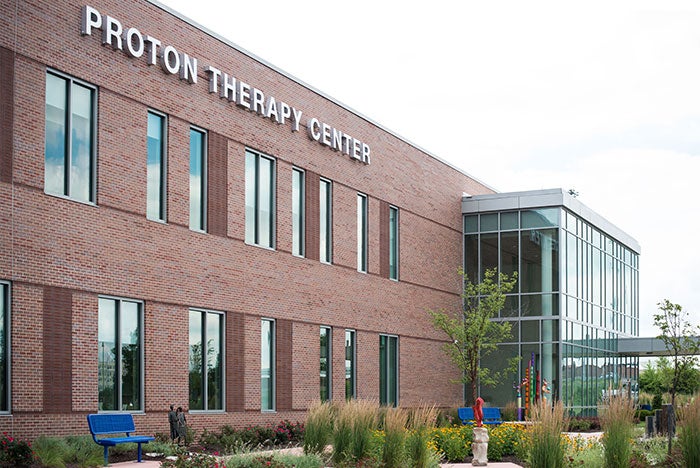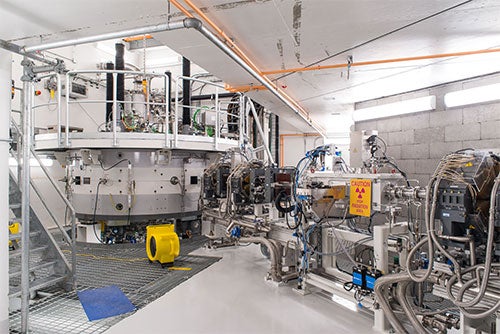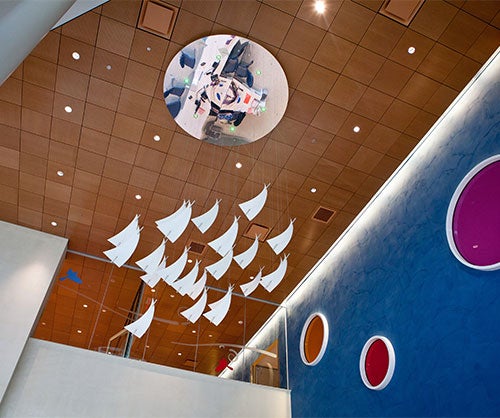Cincinnati Children's new proton therapy center to provide advanced care, research

This new facility is one of a handful in the U.S. that provides proton therapy for pediatric patients.
Cincinnati Children's Hospital Medical Center and UC Health opened a new $120 million proton therapy center Aug. 8 that will provide more precise and advanced radiation treatment as well as extensive research opportunities.
Located at Cincinnati Children's Liberty Campus, the facility is one of the most advanced proton research and cancer treatment centers in the world, according to the medical center. It is scheduled to start treating patients next month.
The Cincinnati facility will serve families from Cincinnati and the surrounding region as well as patients referred there from other parts of the U.S. and the world, according to Cincinnati Children’s.

Proton therapy is a medical procedure utilizing a beam of protons to blast diseased tissue with remarkable precision.
The center features a Varian ProBeam Proton Therapy system and two clinical gantries, one for pediatric patients and the other for adults. The center has separate entrances for children and adults.
A third gantry is dedicated to research and the building includes space for a fourth.
A 90-ton cyclotron or particle accelerator, the heart of the system, was shipped from Germany to Cincinnati.
"This important investment will transform cancer care for children and adults and generate a new wave of discovery," says Michael Fisher, president and CEO, Cincinnati Children's.
"Proton is advanced cancer therapy. I am pleased it is now available to our pediatric patients with the most challenging types of cancer, underscoring our deep commitment to always provide the safest and most effective treatment options," he says.
Proton therapy is a form of radiation treatment used for certain types of cancers. The medical procedure involves a type of particle therapy utilizing a beam of protons to blast diseased tissue precisely.
It works by extracting positively charged protons from hydrogen gas and accelerating them through the cyclotron up to nearly two-thirds the speed of light. The protons are guided to the tumor site by powerful magnetic and electrical fields, and carry just enough charge to reach a precise point in the tumor.
Traditional radiation treatment kills targeted cancer cells, but can also damage surrounding healthy tissue. Proton therapy is expected to significantly reduce the risks because of its precision, allowing cancer survivors to have far fewer long-term consequences.

A bright and cheerful mobile hangs in the lobby of the children’s lobby of the Proton Center.
Although more than 200 medical centers in North America provide pediatric cancer care, only 13 facilities provide proton therapy.
"This facility, together with the expertise of the faculty of the University of Cincinnati College of Medicine and Cincinnati Children's, will give patients access to a level of cancer care available in only a handful of locations around the world," says Richard Lofgren, M.D., president and CEO of UC Health.
In addition to providing treatment, the center will have the world's only proton treatment gantry fully dedicated to research along several tracks, including basic biological research to understand exactly how protons kill cancer cells; applied research and development for evaluating imaging methods, computer-targeting technologies and patient positioning techniques, and more.
The research will be done in cooperation among Cincinnati Children's, UC Medical Center, the University of Cincinnati Physicians, the UC College of Medicine, and Varian, the proton equipment manufacturer.
Contractors on the project included Messer Construction of Cincinnati and the Linbeck Group LLC of Houston.
In other health care facility news:
Jackson Health System, Miami, selected Gresham, Smith and Partners, Nashville, Tenn., to design a $121 million expansion and renovation project for Jackson North Medical Center.
The expanded facility will feature a modernized surgical department with 10 new 600-square-foot operating rooms and an emergency department that will double in size. A new intensive care unit will include 30 new rooms.
New renovations will add three new labor and delivery rooms and double the size of the existing recovery rooms. The project scope also includes a brand new entrance and lobby area.
CHI (Catholic Health Initiatives) Franciscan Health was scheduled to open the only outpatient midwifery birth center located on a hospital campus in the state of Washington today in Tacoma.
The Midwifery Birth Center at St. Joseph will improve access to care for low-risk expectant mothers who will deliver their babies with the assistance of a midwife.
The state-of-the-art facility offers families individual birth suites with a wide range of amenities, including a hydrotherapy birthing tub, birthing ball, birthing hammock, a comfortable queen-sized bed and many other comforts found in a traditional home.
Want to see your new health care construction project featured on HFM Daily? Email project information and photos to Senior Editor Jeff Ferenc or tweet to him @JeffFerenc.




